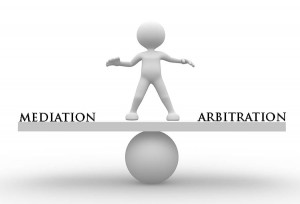
ARBITRATION & MEDIATION
The main difference between arbitration and mediation is a simple one: arbitrators hand down decisions, just as judges do, which can only be contested under certain circumstances. In other words, by agreeing to arbitration a party agrees to be bound by the arbitrator’s ruling, barring some exceptional deviation from the normal procedure.
MEDIATION
-> Can be voluntary or compulsory (court ordered)
-> Trial is stayed (put on pause) pending outcome
-> Generally involves a single mediator
-> Mediators need not have any formal legal training
-> Choice of mediator often has an important effect on the settlement reached
-> Mediator’s function is to facilitate negotiation
-> Mediation ends when settlement is reached or when parties are deadlocked
-> Agreements to mediate are generally enforceable, requiring the parties to make a good faith effort to arrive at a settlement agreement
ARBITRATION
-> Can be voluntary or compulsory (court ordered)
-> Trial is replaced by arbitration
-> There might be a single arbitrator or a panel of arbitrators
-> Arbitrators need not have any formal legal training
-> Choice of arbitrator can be crucial, and especially in panel situations can lead to further litigation
-> Arbitrator’s function is to render a decision on the matter
-> Arbitration ends when the decision is handed down
-> Agreements to arbitrate are generally enforceable, requiring the parties to accept the arbitrator’s decision as if it were a court decision

